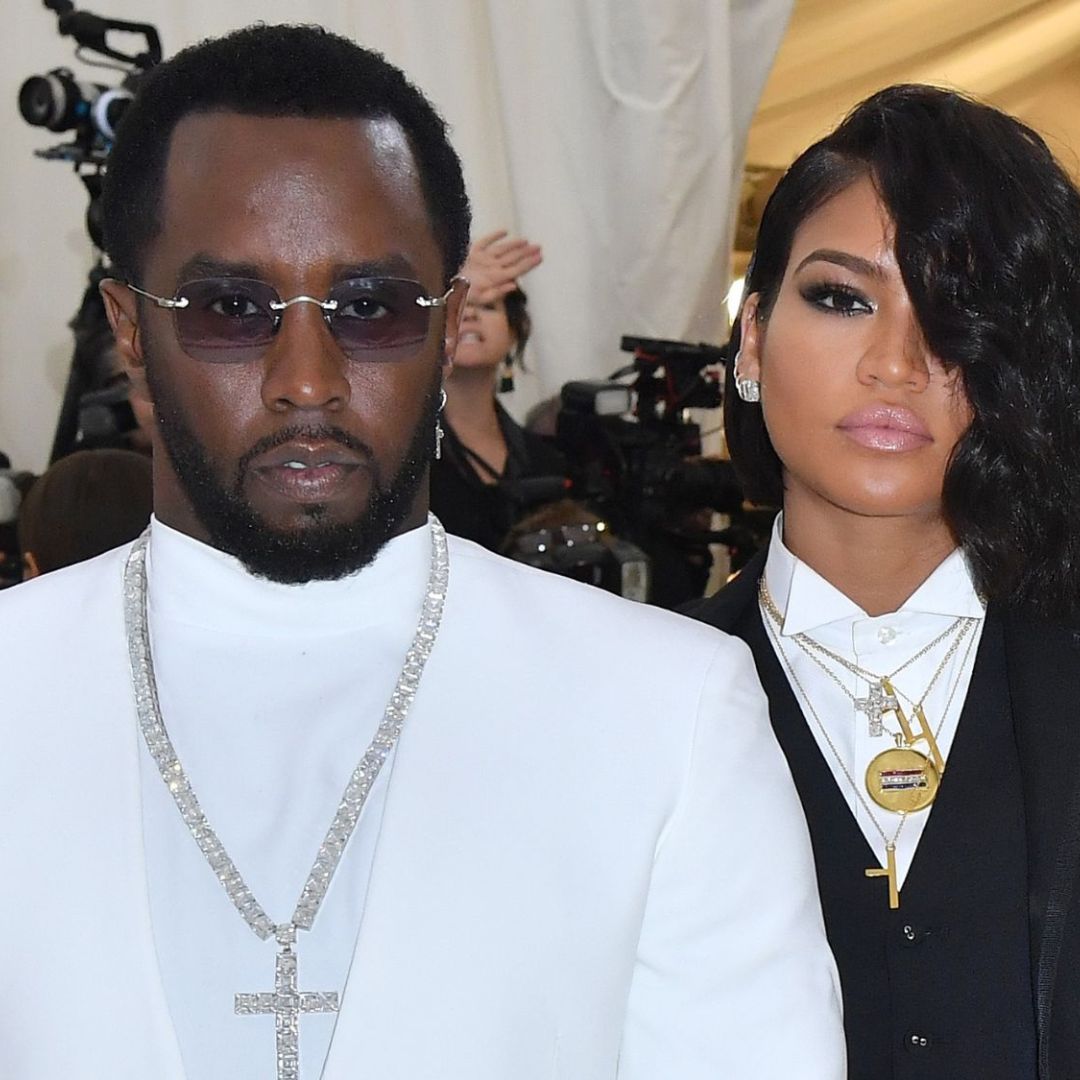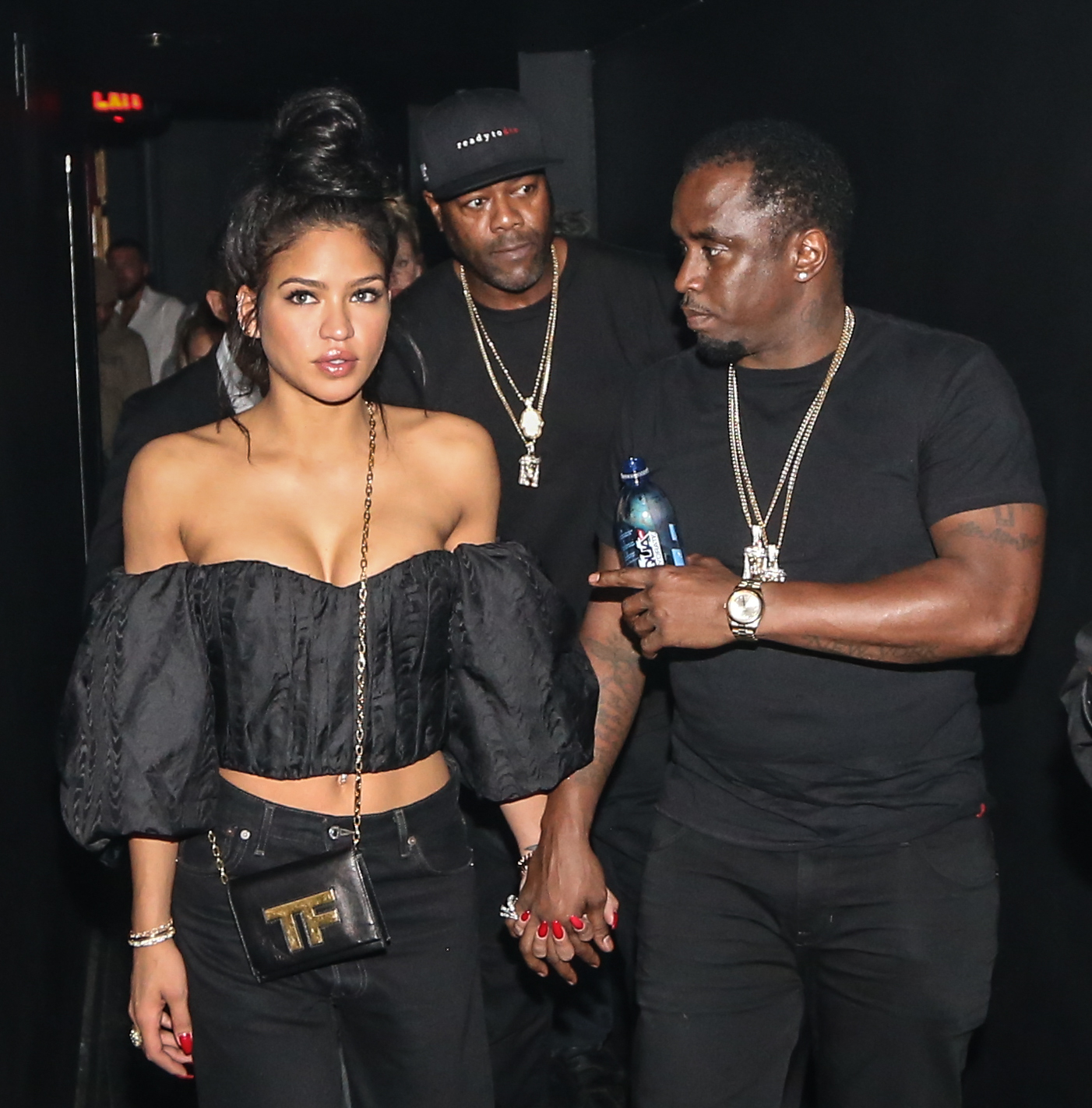
TRIGGER WARNING: This article contains themes of abuse and physical assault
Across their lifetime, 1 in 3 women are subjected to physical or sexual violence by an intimate partner, according to WHO, but Cassie’s lawsuit against Sean “Diddy” Combs shows us the lengths women have to go to to be believed.
This weekend, like women worldwide—and men, too—I watched in horror as the latest video showing we are in a female violence epidemic did the rounds on social media. The film in question, released by CNN, shows a surveillance video from a California hotel in 2016 in which Sean “Diddy” Combs violently attacks then-girlfriend Cassie Ventura after she tries to flee their hotel room. In the video, Combs is seen pulling Ventura to the floor by her hair, kicking and shoving her before dragging her back to the room. It is these final seconds before the pair are out of view that most haunts me. As someone who has volunteered with women’s shelters and witnessed first-hand loved ones suffer domestic abuse, being pulled by their hair is a story I have heard more times than I’d like to remember.
It’s all the more harrowing as Combs allegedly ordered Cassie to shave half of her head in 2009. Details of the incident re-emerged when Cassie filed a lawsuit against Combs on 16th November 2023. The 35-page filing alleged Combs had kept Cassandra Ventura in a “cycle of abuse, violence, and sex trafficking” during their 10-plus-years relationship. Combs was quick to plead his innocence, and fans of the rapper, as well as high-profile celebrities like Ja Rule, Nick Cannon, Real Housewives’ Peter Thomas, rapper Slim Thug, and more, defended him. Cassie was branded a ‘gold digger’ and questioned for her reasons for speaking out six years after breaking up with Combs.
Despite some high-profile support for Cassie, the response was overwhelmingly mixed, with many of the loudest voices and most vehement support siding with Combs. Fired up from the Bad Boy Records founder’s claim that the allegations of abuse and sexual assault were “offensive and outrageous”, social media users argued in defence of Combs, who was quick to draw attention to Cassie’s $30 million (£24m) settlement request. Combs knew that money is weaponised against women who dare to speak out against famous abusers, so he used it as a catalyst, throwing gas on an already explosive discussion—one which Cassie notably had not publicly spoken about. The case was privately settled within one day, and details were not disclosed.
This did not deter Diddy’s defenders from publicly tearing down Cassie. When @complex and @complexnews posted on 16th November that “Diddy is being sued by Cassie for physical abuse according to court documents”, comments like “Im [sic] so sick of late allegations. Do it when it’s done.” received 348 likes and led to over 141 replies, a snippet of which reads like an Andrew Tate forum. “the money dried up”, “she misses that diddy money”, and “you b!tches kill me with this BS… rape me & beat me up yet still stood with his. You must of like it & now you’re crying wolf because you didn’t get your own way lmao”.
Others joked that Combs would have her killed for coming forward; “Now she just needs to make sure to never stop at a red light from now on 😂”, wrote one user, alluding to the conspiracy theory that Combs orchestrated the murder of Tupac Shakur. Others took the bizarre stance of arguing that; “Women who didn’t compromise their morals for 20 years to make boatloads of money should be able to sue victims for not reporting this stuff right away”. It’s telling that the commenter, @lv.d.lee, sees Cassie as a victim but falls into the trap of thinking there is a ‘right’ and a ‘wrong’ type of victim. The comment, “her debit card must’ve declined somewhere”, also racked up likes.
Many are left wondering why it has taken literal video evidence for Cassie to be believed
Now that the video has surfaced, the silence of these men—and they are predominantly men—is deafening. While some on social media are celebrating the mogul’s (Combs is worth an estimated $1 billion according to Business Insider) supposed demise, many, like myself, are left wondering why it has taken literal video evidence for Cassie to be believed (and still, there are naysayers). There have been murmurings of abuse within Diddy’s circle since as early as 1999 when he was arrested on felony charges of assault and criminal mischief after beating up an Interscope Records exec at Universal Music. 50 Cent—who has a longstanding feud with Combs—called out his suspicious behaviour in 2018.
By the time Combs met Cassie in 2005, when he was 37, and she was 19, there had already been court-ordered anger-management classes, a much-mythologised shooting (involving an unlicensed firearm), and allegations that his Sean Jean line was operating out of a Honduran sweatshop. The Independent reports that during his relationship with Cassie, Combs was arrested and charged with three counts of assault with a deadly weapon, one count of making terrorist threats and one count of battery, but prosecutors ultimately decided not to pursue felony charges. Despite all this, when Cassie’s case opened late last year—alongside two other cases of sexual assault—she was brandished an unreliable victim, the basis being that she’d stayed with Combs for too long for it to ‘have been that bad’.
As Sharon Bryan, Head of Partnerships & Development at The National Centre for Domestic Violence, explains, “There are many reasons why women do not come forward - these range from fear to love.” Bryan explains fear of not being believed is common in many cases, as abusers will have repeatedly told the abused that they will never be believed.

Refuge reports it will take a woman, on average, seven attempts to leave an abusive partner. That number can increase when children are involved. The same report highlights that the police receive a domestic abuse-related call every 30 seconds, yet it is estimated that less than 24% of domestic abuse crimes are reported to the police.
“Women do not trust the authorities that are there to keep them safe.” explains Bryan, adding, “We need to improve the support women are given when they do disclose abuse.” Last year, NCDV—a non-profit Community Interest Company—took 100,318 referrals. Many of these were from women who did not want to report the abuse to the police, so instead, they sought civil remedies, such as non-molestation orders.
Part of the problem, Bryan explains, is that women are victim-blamed by authorities such as the police, children’s services, and housing. At a time when women’s safety should be the number one priority, instead of being asked, “What can we do to help or keep you safe?” women are being asked by the services supposedly designed to protect them, “Why don’t you just leave”? This is the worst question you can ask a victim or survivor of domestic abuse and or violence, says Bryan.
Reporting can also have very real implications for victims’ safety, and many fear retribution from perpetrators.
Alessia Bianco, Domestic Abuse and Sexual Violence Prevention team at Hestia
Many people will question why Cassie didn’t ‘just leave’ after that hotel incident, but to fall into this line of thinking would further perpetuate the insidious notion that a woman’s safety in a relationship is her responsibility and that she has complete authority over it. In all likelihood, she has little autonomy at all.
“Court delays, re-traumatising court procedures and low rates of prosecution have deterred far too many survivors seeking justice,” says Interim CEO of Refuge, Abigail Ampofo. She explains that only one in five survivors report domestic abuse to the police, as so few women have confidence in the criminal justice system.
Two women a week are killed by a current or former partner in England and Wales, and key findings from the most recent Femicide report reveal of the 110 women who were killed in 2020, 52% were murdered by current or former partners. We live in a society that scrutinises victims and protects abusers. Combs was emboldened to lash out physically in a public space, knowing there would be security cameras (which he reportedly paid $50,000 for the copies of). If men are comfortable enough to commit these crimes in plain view, what is happening behind closed doors?
Two women a week are killed by a current or former partner in England and Wales
Refuge
“The abuser will, no doubt, apologise after every incident of abuse and/or violence,” explains Bryan, who says abusers deploy this tactic to keep their victims quiet. I’m reminded of Combs’ recent video apology, filmed from an undisclosed beach hut where he is hiding out in Antigua. As Cassie’s lawyer so acutely pointed out, Combs centres the narrative around himself and his struggle, essentially attributing this abhorrent act to drug misuse and personal difficulties.
Perpetrators don’t accept responsibility for their abusive behaviours, explains Kathryn Mann, a Senior Support Worker at Women’s Aid. More often than not, she says, abusers will blame the other person, leading women to feel shame or guilt about the abuse and that she is to blame. According to Combs, cocaine was the culprit.
“It can take years for a survivor to feel safe enough to speak out about their experience,” adds Alessia Bianco, Domestic Abuse and Sexual Violence Prevention team at Hestia. She says that recent campaigns such as the ‘Me Too’ movement have led to a broader societal understanding about abuse, which may help more people feel able to come forward.
Mann says there is a lack of trust in the criminal justice system as prosecutions and convictions for domestic abuse have decreased in the last quarter despite domestic abuse figures remaining largely unchanged over the past decade. The World Health Organisation reports that one in three women—around 736 million worldwide—are subjected to physical or sexual violence by an intimate partner or sexual violence from a non-partner.
When high profile perpetrators are seen to ‘get away’ with sickening abusive behaviour, this sends the very clear message that women won’t be believed.
Nicola Miller, CEO of The Dash Charity
“It is understandable that women won’t come forward if they feel like their perpetrator won’t be held to account,” argues Mann. For anyone watching the abuse against Cassie unfold in the months following her case, it instils little hope in being believed, let alone supported. “Simply put, women cannot be confident when reporting their abuser,” confirms Ampofo. For Cassie, the video revelation will not lead to criminal justice as it exceeds that statute of limitations. In an Instagram post, The Los Angeles County District Attorney George Gascón explained that “unfortunately”, the authorities are “unable to charge as the conduct would have occurred beyond the timeline where a crime of assault can be prosecuted.”
“When high profile perpetrators are seen to ‘get away’ with sickening abusive behaviour even when it is caught on camera, but not held to account, this sends the very clear message that women won’t be believed,” argues Nicola Miller, CEO of The Dash Charity.
Cassie was violently abused, publicly gaslit and accused of lying, and now that the truth has been unquestionably revealed, her abuser cannot be held accountable. As Miller says, this does little to reassure victims and create the lasting change we all need. Can anyone be surprised why women don’t come forward sooner? Or come forward at all? It seems the only ones left still scratching their heads are those either willingly or unwittingly upholding misogynistic ideas and an insidious acceptance of violence against women and girls. Or, you know, maybe @slabrab18 was right when he wrote on Instagram, “...I don’t buy all this shit about you scared no it’s money…”
If you, or someone you know, is suffering domestic abuse, you can contact the national domestic abuse helpline on 0808 2000 247 or visit Women’s Aid or Refuge.







